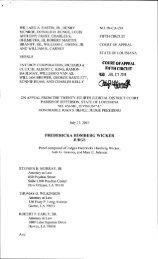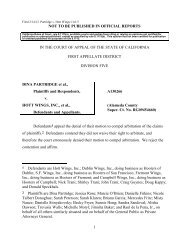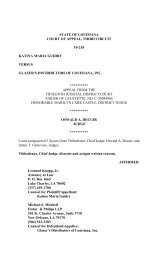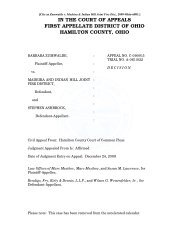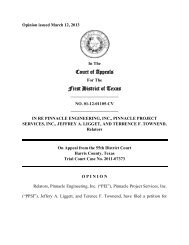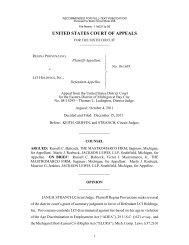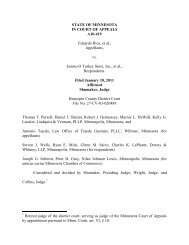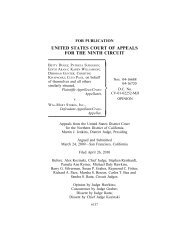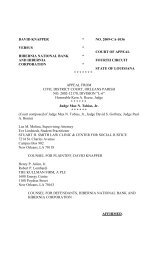BALEN v. HOLLAND AMERICA LINE - LawMemo
BALEN v. HOLLAND AMERICA LINE - LawMemo
BALEN v. HOLLAND AMERICA LINE - LawMemo
Create successful ePaper yourself
Turn your PDF publications into a flip-book with our unique Google optimized e-Paper software.
14218 <strong>BALEN</strong> v. <strong>HOLLAND</strong> <strong>AMERICA</strong> <strong>LINE</strong><br />
claims against HAL and (2) Section 29 of the Standard Terms<br />
made his claims subject to arbitration.<br />
II. DISCUSSION<br />
We review de novo the district court’s decision to grant or<br />
deny a motion to compel arbitration. Bushley v. Credit Suisse<br />
First Boston, 360 F.3d 1149, 1152 (9th Cir. 2004). The underlying<br />
factual findings are reviewed for clear error. See Ticknor<br />
v. Choice Hotels Int’l, Inc., 265 F.3d 931, 936 (9th Cir. 2001).<br />
Balen contends the district court erred in compelling arbitration,<br />
because (1) the Convention does not apply to Wage Act<br />
claims and (2) the arbitration agreement is invalid. We disagree.<br />
A. The Convention requires enforcement of arbitration<br />
agreements.<br />
[1] It is well-settled that “questions of arbitrability must be<br />
addressed with a healthy regard for the federal policy favoring<br />
arbitration.” Moses H. Cone Mem’l Hosp. v. Mercury Constr.<br />
Corp., 460 U.S. 1, 24 (1983). “[A]ny doubts concerning the<br />
scope of arbitrable issues should be resolved in favor of arbitration<br />
. . . .” Id. at 24-25. The Supreme Court has consistently<br />
recognized “the emphatic federal policy in favor of arbitral<br />
dispute resolution,” a policy that “applies with special force<br />
in the field of international commerce.” Mitsubishi Motors<br />
Corp. v. Soler Chrysler-Plymouth, Inc., 473 U.S. 614, 631<br />
(1985). Article II(1) of the Convention also recognizes the<br />
importance of arbitral resolution. It provides that “[e]ach Contracting<br />
State shall recognize an agreement in writing under<br />
which the parties undertake to submit to arbitration all or any<br />
differences which have arisen or which may arise between<br />
them in respect of a defined legal relationship, whether contractual<br />
or not, concerning a subject matter capable of settlement<br />
by arbitration.” Convention, supra, art. II.



